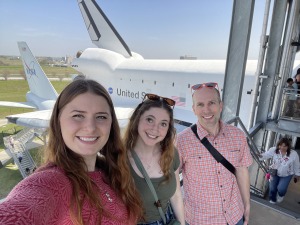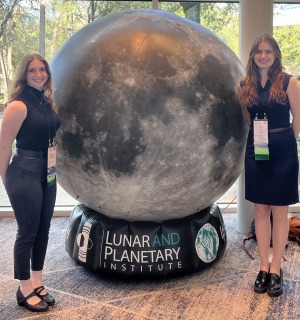A faculty-guided undergraduate research project exploring planetary science recently led to an opportunity to present at an international conference in Texas.
Fitchburg State Professor Reid Parsons of the Environmental, Geographic and Public Health Sciences Department accompanied Madison Ambrogi ‘26 and recent graduate Kate Messer ‘24 to the 56th Lunar and Planetary Science Conference in March in Houston. The annual conference is the largest international gathering of planetary scientists and is held near NASA's Johnson Space Center.
The students had taken Parsons’ course on geomorphology in 2023, where the professor said they distinguished themselves in the class. The course explored the processes that shape the Earth’s surface, addressing topics from plate tectonics to rivers and glaciers.
“The two of them took initiatives to lead group projects, collect data, and come up with efficient project plans when assigned a complex task like surveying a section of stream in the Fitchburg area,” Parsons said. “Maddi and Kate worked well together and were both very curious to learn more, so they were a natural fit for a research project like this one.”
The research was deeply technical, mapping and measuring hundreds of closely-spaced, parallel ridges found in two separate, enigmatic deposits near the equator of Mars, Parsons said. “Using specialized mapping software, Kate and Maddi meticulously cataloged and saved their data into ever-growing spreadsheets,” he said. “Despite this repetitive work, Kate and Maddi were upbeat, and careful in their data collection because they recognized the importance of the data they were collecting for testing competing ideas about how these martian deposits formed. In the end, they were incredibly productive, and collected much more data than I originally anticipated, allowing the research to move ahead of schedule.”
Parsons felt their work was worthy of submission to the national conference, and a three-year grant the university received in 2022 from NASA’s Mars Data Analysis Program would cover the costs of their participation.
“The NASA grant that funded our work included funds to support travel for undergraduate researchers to present at this conference, and I wished to give Kate and Maddi an opportunity to present their work and receive recognition for the exceptional effort and the quality of the data they were able to collect,” he said. The university also assisted with Messer’s travel logistics.
“After a summer’s worth of this research, it was an incredible experience to translate our work into a tangible product that we were able to share with such intelligent and insightful peers,” said Ambrogi, a Templeton native who is double-majoring in environmental and Earth science and biology, with minors in chemistry and geographic information systems (GIS).
Ambrogi offered high praise for her research partner and faculty mentor. “Throughout the research, the production of the poster, and the preparation of the presentation itself, there is nobody I would have rather had by my side than Kate,” she said. “She is fiercely intelligent, endlessly curious, and has a poised confidence about her unlike anything I’ve ever seen. Furthermore, we were incredibly lucky to have worked under Dr. Parsons for the duration of this research. Although it is relatively commonplace to assume that there are people of great intellect employed at academic institutions, Dr. Parsons truly operates on another level.”
“Working alongside Maddi was always a pleasure, she is a dedicated and skilled collaborator,” said Messer, from Mason, N.H., who graduated in 2024 with a major in Earth and environmental science and a minor in GIS. “Dr. Parsons was an incredible mentor to have for this research. His depth of knowledge on the topic and eagerness to share the research space and knowledge with his student researchers was such a beneficial and educational space to have the privilege of being a part of.”
Ambrogi said the academic and professional conversations they engaged in at the conference were inspiring, including recommendations for future work and supplemental thoughts on their research. “Furthermore, there was something oddly gratifying about describing the quaint little state school to which the three of us belonged to fellow conference-goers as Kate and I presented, almost as if we were defying the notion that only larger, well-known schools attended conferences as prestigious as these,” she said.
“It was a privilege to be able to not only present our research at this conference, but to represent Fitchburg State,” Ambrogi continued. “I have been lucky enough to take a vast variety of courses with our environmental and Earth sciences department, and Dr. Parsons epitomizes our faculty’s excellence. I have learned, developed, and bettered myself for nearly three years as a result of these professors’ support, and to have been given the opportunity to demonstrate and pay homage to all they have done for us students was an honor. I am so grateful to have been extended this opportunity, and cannot recommend undergraduate research enough.”
I have learned, developed, and bettered myself for nearly three years as a result of these professors’ support, and to have been given the opportunity to demonstrate and pay homage to all they have done for us students was an honor.
“To have the opportunity to present this research at a national conference was incredible,” added Messer. “We were both quite nervous to be in such a highly academic atmosphere surrounded by talented individuals presenting our research, however, together Maddi and I practiced our presentation and were able to move through the process comfortably. Dr. Parsons also offered much support and encouragement throughout the time, which made us feel much more comfortable in such a high-level academic environment.”
“Representing Fitchburg State at this level was an honor I am deeply proud of,” Messer continued. “Having the chance to showcase my university’s research alongside other undergraduate, graduate, and faculty attendees from across the country instilled a profound sense of pride in the strength of our program. I would like to express my heartfelt gratitude to Dr. Parsons for his mentorship throughout this research and beyond—it has been invaluable to my academic growth. I’m also deeply appreciative of the Fitchburg State staff who made my attendance as an alumnus possible, marking the university’s first student presence at this event. Lastly, I want to reflect on how transformative this trip was for me. It not only expanded my understanding of planetary science but also allowed me to build meaningful connections with others in the field.”
Parsons–who was pleased to accompany the students on a side trip to NASA’s Houston Space Center during their travels–said he plans to include the students’ work as co-authors of a scientific journal article he is developing.


